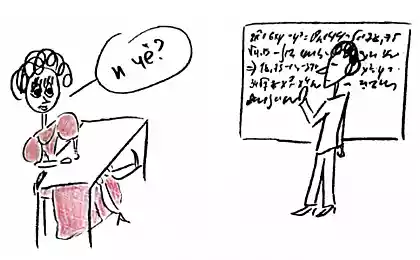884
Psychologist Lera Boroditsky: Learning a language will help us understand what makes us human.

“Learning a language will help to understand what makes us human”: psychologist Lera Boroditsky on how language shapes thinking Language significantly affects the picture of the human world. It defines such fundamental foundations of human knowledge as ideas about space, time and cause-and-effect relationships. An article by psychology professor Lera Boroditsky on how Amazonian Indians do without numerals, why Jewish children are aware of their sexual identity before Finnish children, and how the features of the Chinese language affect the mathematical abilities of Chinese people.
© Anton Gorbunov
Lera Boroditsky is an assistant professor of cognitive psychology at Stanford University and editor-in-chief of Frontiers in Cultural Psychology. Her team conducts research on the problems of mental reflection of reality and the influence of language on cognitive processes.
I'm talking to a five-year-old girl from Pormpurow, a small Aboriginal area on the western end of the Cape York Peninsula in Northern Australia. If I ask her to point north, she does so without hesitation, and as my compass shows, absolutely. After a while, I ask the same question in a lecture at Stanford University, where there are distinguished scientists who have won awards and medals for scientific achievement. I ask them to close their eyes so that they do not see the actions of their neighbors, and I suggest that they point north. Many refuse immediately, because they are not able to do it at all, others think for a while, and then point out all possible directions. I repeated this experiment at Harvard, Princeton, Moscow, London and Beijing, and the result was always the same.
Undeniable influence
So, a five-year-old girl from a particular culture can easily do things that big scientists from another culture can't. What can be the reason for such significant differences in one of the cognitive abilities? Surprisingly, the reason may be the difference in the language of communication. The idea that linguistic features can affect cognitive functions was expressed several centuries ago. Since the 1930s, they have been confirmed in the works of American linguists Edward Sapir and Benjamin Lee Whorf. Studying the differences between languages, they came to the conclusion that speakers of different languages think differently. Such views were initially met with great enthusiasm, but unfortunately they were not supported by objective data. By the 1970s, many scientists had become disillusioned with the Sapir-Whorf hypothesis, and it was replaced by theories of the universality of thought and speech. However, today, a few decades later, a lot of factual material has finally appeared, testifying to the formation of thinking under the influence of the peculiarities of language. These facts refute the established paradigm of universality of thinking and open new fascinating perspectives in the field of the origin of thinking and ideas about reality. In addition, the findings may have important legal, political and pedagogical implications.
There are more than 7 thousand languages in the world, and each of them requires special speech turnovers. Let's say I want to report that I've seen Uncle Vanya on 42nd Street. In the Mian language spoken in Papua New Guinea, depending on the verb I use, the interlocutor will know that I saw the film just yesterday or a long time ago. In Indonesian, by contrast, it won't even be clear from the construction of the verb whether I've seen it or just going to look at it. In Russian, my gender will become clear from the verb, and in Mandarin, I will have to clarify whether we are talking about an uncle on the paternal or maternal line and about kinship by blood or marriage - a different noun is used for each of these cases. And in the language of Piraha (which is spoken by a small tribe living in one of the tributaries of the Amazon), I could not even say “42nd Street” – there are no numbers in it, only the concepts of “little” and “many”.
In the language of Tayore (Kuk Tayore) there are no such spatial concepts as "left" and "right". Instead, they use the designations of absolute directions - north, south, east and west. The differences between different languages are endless, but this does not mean that speakers of different languages think differently. Can we say that Mian, Indonesian, Russian, Mandarin, or Piraha speakers end up having different perceptions, recalls, and reasonings about the same phenomena? On the basis of data obtained in my laboratory and several other laboratories, we can assume that language does influence such fundamental foundations of human knowledge as ideas about space, time, causality and relationships with other people.
Let's go back to Pormpurou. In the language of Tayore (Kuk Tayore), spoken in this area, there are no such spatial concepts as "left" and "right". Instead, they use the designations of absolute directions - north, south, east and west. In English, of course, such concepts are also used, but only to indicate global directions. We will never say, for example, “Well, lettuce forks were put southeast of the dining room!” In Taiore, by contrast, absolute directions are used on all spatial scales: for example, “the cup is southeast of the plate” or “the boy south of Mary is my brother.” Thus, in order to communicate in this language, you need to constantly navigate in space.
Data from the past two decades in the groundbreaking work of Stephen C. Levinson of the Max Planck Institute for Psycholinguistics in Nijmegen, the Netherlands, and John B. Haviland of the University of California, San Diego, show that speakers of languages that use absolute direction designations are remarkably well oriented in space, including unfamiliar terrains or buildings. They do this better than the regular inhabitants who speak ordinary languages; moreover, their abilities are beyond the scope of modern scientific ideas. Apparently, such amazing opportunities are formed under the influence of the peculiarities of the language.
Features of perception of space entail features of perception of time. In particular, my colleague from the University of California (Berkeley) Alice Gaby (Alice Gaby) and I presented to the speakers of the tayor illustrations with different events unfolding in time - a growing man, a growing crocodile, eaten banana. After mixing the pictures, we asked the subjects to arrange them in a certain time sequence.
Each participant performed the procedure twice, being positioned in different directions. English speakers spread cards from left to right, and from right to left in Hebrew: thus, the peculiarities of writing determine our ideas about temporal organization. In the case of the Tayor speakers, the picture was different: they placed cards in the direction from east to west. In other words, if they were sitting facing south, the cards were spread from left to right; from north to right to left; from east to east, from themselves. We did not tell any of the subjects how the cardinal directions were oriented: they knew about this themselves and spontaneously used orientation in space to form a temporal structure.
There are other differences in perceptions of time among different cultures. It is said in English that the future is ahead and the past is behind. In 2010, Linden Miles, a researcher at the University of Aberdeen in Scotland, and his collaborators found that English speakers leaned forward subconsciously when thinking about the future and backward when thinking about the past. However, in the Aymara language spoken by Andeans, the future is behind and the past ahead. Correspondingly, their gestures differ: in 2006, Rafael Nunes of the University of California, San Diego and Eva Sweetser of the University of California, Berkeley, showed that speakers of Aymara lean forward and backward when they mention the past.
Everyone remembers in their own way.
Native speakers of different languages describe events differently, and as a result, they remember the roles of their participants differently. Each event, even the most fleeting, is a complex logical structure that requires not only accurate reconstruction, but also interpretation. Take, for example, the famous story of how former US Vice President Dick Cheney on the hunt instead of quail accidentally wounded his friend Harry Whittington. History can be described in different ways. You could say, for example, "Cheney hurt Whittington," and that would point directly to Cheney as the culprit. Another way of saying, “Wittington was wounded by Cheney,” is to distance Cheney from the event. You can leave Cheney behind the scenes by writing Whittington Get Shot. Cheney himself put it this way (literally): "Ultimately, I am the person who pulled the trigger on the gun that fired the charge that injured Harry," thereby dividing myself and the accident into a long chain of events. And then-US President George W. Bush came up with an even more dexterous formulation: “He heard the sound of the wings, turned around, shot and saw that his friend was injured,” one phrase turning Cheney from the culprit of the accident into a mere witness.
Agency is interpreted by linguists as a property of a linguistic construction, in which a person appears not as a subject of action, but as an object. Simply put, a person describes the situation as if he has nothing to do with what is happening, the event was influenced by circumstances beyond his control.
Such verbal tricks rarely have an impact on Americans, because in English-speaking countries, where the main task of children and politicians is to evade responsibility, non-aggressive constructions sound like something clearly evasive. English speakers prefer phrases that directly indicate a person’s role in an event, such as “John broke a vase.” On the contrary, the Japanese and Spaniards often use non-agent constructions of the type “vase broke” (Spanish – “Se rompiu el florero”), in which the perpetrator of the incident is not directly mentioned.
My student, Caitlin M. Fausey, and I have found that these linguistic differences can cause differences in the replay of events and eyewitness memories. In our research, published in 2010, English, Spanish and Japanese speakers were shown videos of two people puncturing balloons, breaking eggs and spilling liquids — in some cases accidentally, in others deliberately. They were then asked to recall who was responsible for the incident, as in identifying the suspect. In terms of language, the results were predictable. Speakers of all three languages described intentional events using agentic constructs such as "He punctured the ball" and remembered the perpetrators equally well. However, the memory of accidental incidents had very characteristic differences. Compared to English speakers, participants who spoke Spanish and Japanese were less likely to describe incidents using agentic constructs and less likely to remember their culprit. At the same time, in general, their ability to remember was not worse – intentional events, in the description of which the culprit was, of course, indicated, they remembered as well as native English speakers.
In Hebrew, the designation of gender is extremely common (even the word “you” varies depending on it), Finnish is used much less often, and English occupies an intermediate position in this respect. It turned out that the children who grew up among the Hebrew speakers realized their gender a year earlier than the Finnish speakers. Language affects not only memory, but also learning. In many languages, the structure of numerals more clearly corresponds to the decimal system than in English (in Chinese, for example, there are no exceptions such as "eleven" for eleven and "twelve" for twelve, where the general rule of adding to the numeral denoting units, the basis of "-teen", similar to the Russian "-teen"), and their carriers quickly master the account. The number of syllables in numerals affects remembering a phone number or counting in the mind. Even the age of awareness of your gender depends on the characteristics of the language. In 1983, Alexandre Guiora, a researcher at the University of Michigan in Ann Arbor, compared three groups of children whose mother tongues were Hebrew, English and Finnish. In Hebrew, the designation of gender is extremely common (even the word “you” varies depending on it), Finnish is used much less often, and English occupies an intermediate position in this respect. It turned out that the children who grew up among the Hebrew speakers realized their gender a year earlier than the Finnish speakers, and the English-speaking children took a certain middle position.
What affects what?
I have given just a few striking examples of differences in cognitive function among speakers of different languages. Naturally, the question arises – do the features of language affect thinking or vice versa? Apparently, both are true: our language depends on how we think, but there is also a reverse effect. In the last ten years, a number of ingenious studies have shown that language undoubtedly plays a role in shaping thinking. It turned out that changing the composition of language affects cognitive functions. Thus, learning new words for colors affects the difference in shades, and words for time affects the perception of time.
Another way to study the influence of language on thinking is to study people who are fluent in two languages. It turned out that the perception of reality to a certain extent is determined by what language such a person speaks at the moment. Two studies published in 2010 found that even fundamental traits such as likes and dislikes could be affected.
One study was conducted by Harvard University researchers Oludamini Ogunnek and his colleagues, the other by the team of Shai Danziger from Ben-Gurion University in the Negev. Both studies examined the subliminal preferences of bilingual subjects — speaking Arabic and French in Morocco, Spanish and English in the United States, and Arabic and Hebrew in Israel. The latter, in particular, offered to quickly press the keys in response to the presentation of different words. In one case, when presented with Jewish names (e.g., “Yair”) or positive attributes (e.g., “good” or “strong”), subjects had to press the “M” key, and when presented with Arabic names (e.g., “Ahmed”) or negative qualities (e.g., “bad” or “weak”), the “X” key. Then conditions changed so that one key corresponded to Jewish names and negative qualities, and the other to Arabic names and positive qualities. In all cases, the response time was measured. This method is widely used to assess subconscious preferences, particularly associations between ethnicity and positive or negative traits.
In Chinese, for example, there are no exceptions like eleven for eleven, and its carriers are quicker to master the score. To the surprise of the scientists, the hidden preferences of the same people differed significantly depending on the language they used. In particular, in the above study, when using Hebrew, the subconscious attitude towards Jewish names was more positive than when using Arabic. Apparently, language affects much more diverse mental functions than is commonly assumed. A person uses speech even when performing simple tasks such as distinguishing colors, counting points on a screen or orienting in a small room. My co-workers and I found that if we interfere with the free use of speech (e.g., asking subjects to repeat newspaper excerpts all the time), these tasks are disrupted. This suggests that the characteristics of different languages can influence many aspects of our mental life. What we call thinking is a complex set of speech and non-speech functions, and there may not be many thought processes that are not affected by language.
The most important feature of human thinking is plasticity: the ability to quickly rebuild ideas about reality when it changes. One of the manifestations of such plasticity is the diversity of human languages. Each of them is characterized by a unique set of cognitive tools and each is based on the knowledge and ideas accumulated in this culture over thousands of years. Language is a way of perceiving, cognition and understanding the world, an invaluable guide to interaction with the environment, created and nurtured by our ancestors. Studying the influence of language on thinking will help to understand how we form knowledge about reality and its laws, reaching new intellectual heights – in other words, the very essence of what makes us human.
P.S. And remember, just by changing your consciousness – together we change the world!
Source: theoryandpractice.ru/posts/5662-izuchenie-yazyka-pomozhet-ponyat-chto-delaet-nas-lyudmi-psikholog-lera-boroditski-o-tom-kak-yazyk-formiruet-myshlenie























